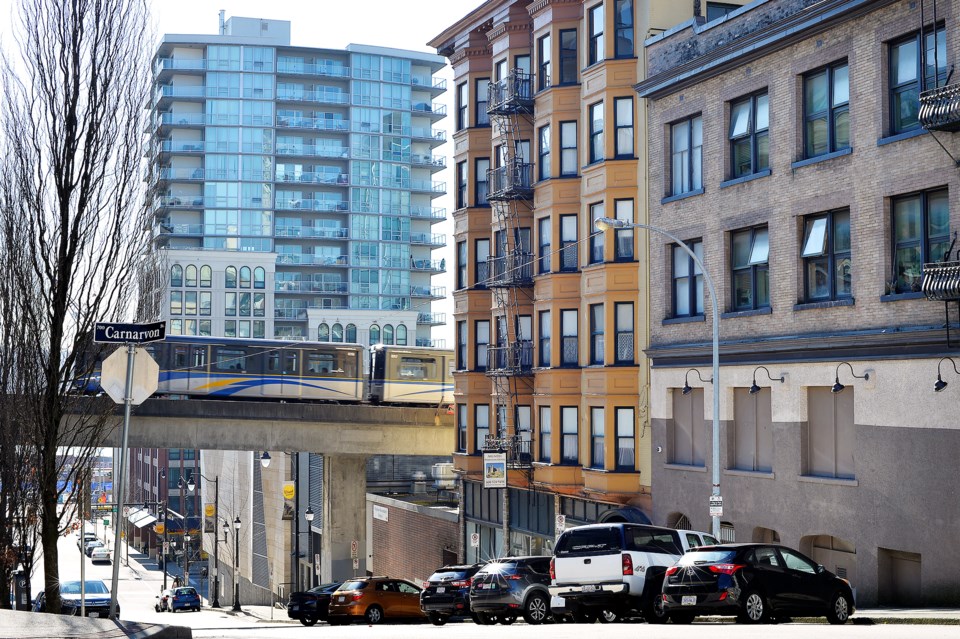A hotel proposal in downtown New Westminster includes an atrium that will bridge the old and the new.
The city has received a pre-application review that would see the residential portion of the six-storey, 1912 Arundel Mansion building at 48 Begbie St. converted to a hotel use and the development of a new six-storey building directly behind it. The two buildings would both be used as hotels.
“This building is a time capsule. I don’t know if many of you have actually ever been inside the Arundel Mansions hotel, but every room, every suite, including the elevator through to the toilets and the fixtures, everything in this building is stepping back in time to the 1920s,” architect Robert Billard recently told the city’s land use and planning committee. “It is an amazing journey.”
Billard said the intent of the project is to preserve the existing building, and the addition of the new six-storey hotel will facilitate that goal. He said an atrium that would be built between the two buildings would provide a transition between the old and the new.
“The idea is to be able to offer people who come to the hotel the package of staying in the 1920s or in the modern version of the hotel,” he told the committee. “I’m pleased with the report, I’m pleased that it’s all finally been put down on paper and in writing so the client can fully grasp the steps that they have to go through in order to get this project approved.”
The committee endorsed several recommendations in a staff report, such as requiring the applicant to provide a full tenant profile of existing units in Arundel Mansion, and requiring a heritage revitalization agreement and heritage designation bylaw for a formal application. In addition, the applicant would have to provide a detailed business plan on the specifics of the proposed hotel operation and to take a number of actions related to its licensing and taxation.
“We are seeking information from the applicant given some past and current issues with enforcement of city regulations on the site,” said Emilie Adin, the city’s director of development services. “Staff is seeking LUPC endorsement that licensing and taxation requirements for the city be resolved during the formal application process.”
According to a staff report, Arundel Mansion was developed as an apartment building in 1912, and was used for residential purposes until at least the late 1980s, but it appears that some of the suites have been rented to short- and long-term visitors from outside the city for the past decade.
“There are no permits or business licences applications on file regarding a change of use at that time,” said the report. “The business licence on file is for a multiple-unit residential rental building. The owners have stated that at least some of the units operate as short-term rental or hotel units.”
Billard said he’s had discussions with the clients regarding the taxation and business licensing issues, and they are very willing to work with the city.
Mayor Jonathan Cote, one of three council members on the land use and planning committee, said it’s an “interesting proposal” that checks off a few city objectives, including providing new hotel spaces in the downtown and preserving and revitalizing important heritage buildings.
“I have been inside this hotel. It really is like stepping back in time. The rooms really are very authentic to what they looked like a generation ago. I think this could be a very unique hotel. I can’t think of a hotel I have ever stayed in that would actually have the old and the new together there, but I think they actually complement themselves really well,” he said. “I think we are dealing with a project that, from an economic point of view does what we are trying to achieve in downtown New Westminster, but also has a really important heritage component.”
The Record will be publishing an ongoing series of stories about projects being considered by the city’s land use and planning committee, which considers pre-applications from developers for projects in the city and provides feedback to city staff and the applicants that can be used to develop a formal application that could be considered by city council. Because the applications coming before the LUPC are preliminary, a lot of changes can arise before they make it to council for its consideration – if they make it that far.



